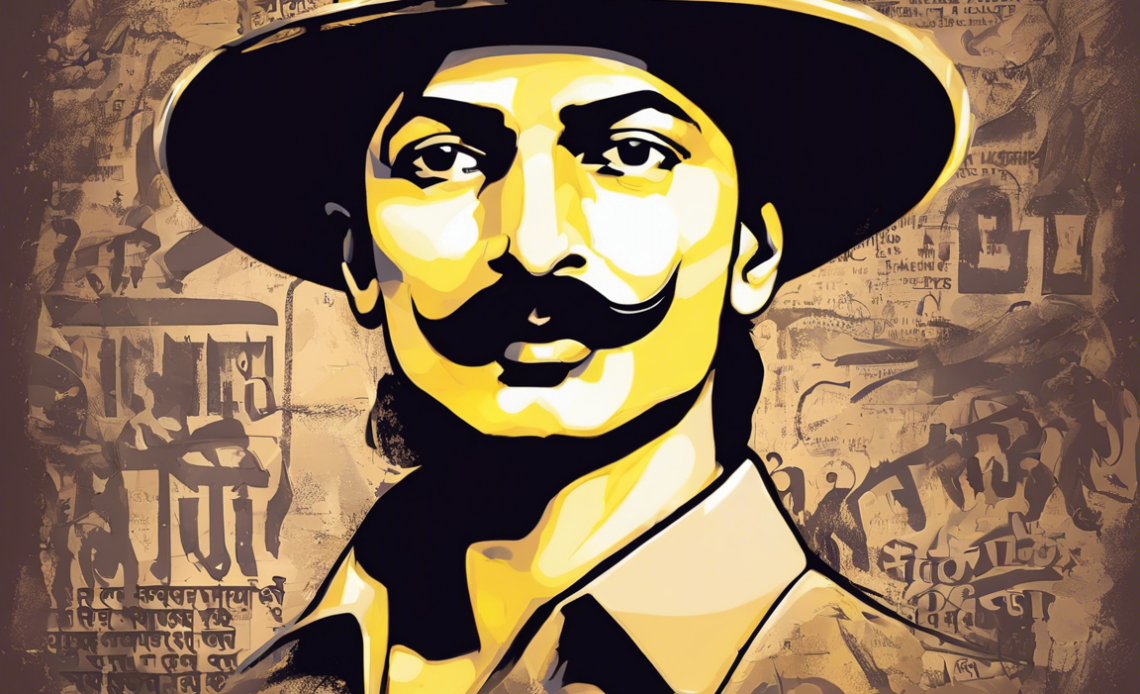
Introduction:
Bhagat Singh, a name synonymous with revolution and patriotism, remains one of the most inspiring figures in India’s fight for independence. His unwavering courage, radical ideas, and sacrifice have immortalized him in the annals of history as a symbol of defiance against oppression.
Early Life and Influences:
Bhagat Singh was born on September 28, 1907, in Banga, Punjab, in a family that was actively involved in the freedom struggle. His father, Kishan Singh, and uncle, Ajit Singh, played pivotal roles in shaping his nationalistic ideals from a young age. The Jallianwala Bagh massacre in 1919 left a profound impact on Bhagat Singh, fueling his desire to fight against British colonial rule.
Entry into Revolutionary Activities:
Inspired by the likes of Chandra Shekhar Azad and Subhas Chandra Bose, Bhagat Singh joined the Hindustan Socialist Republican Association (HSRA) at a tender age. He believed in the power of armed resistance as a means to overthrow British imperialism and revive the spirit of patriotism among Indians.
Role in the Lahore Conspiracy Case:
Bhagat Singh’s involvement in the Lahore Conspiracy Case marked a turning point in his revolutionary journey. The infamous assembly bombing on April 8, 1929, aimed to protest against repressive laws and colonial oppression. Despite the violence, Bhagat Singh and his comrade Batukeshwar Dutt displayed remarkable composure during their trial, using the court as a platform to propagate their revolutionary ideals.
Philosophy of Bhagat Singh:
Bhagat Singh’s ideology was deeply rooted in socialism, secularism, and equality. He envisioned an India free from exploitation, where every citizen had equal rights and opportunities. His writings, including the legendary “Why I am an Atheist,” reflect his intellectual depth and vision for a just society.
Martyrdom and Legacy:
On March 23, 1931, Bhagat Singh, along with Rajguru and Sukhdev, embraced martyrdom for their country. Their sacrifice ignited a wave of nationalism across India, inspiring generations of freedom fighters and serving as a poignant reminder of the price of freedom.
Continued Relevance in Contemporary India:
Even decades after his death, Bhagat Singh’s legacy continues to resonate with Indians. His courage, passion, and dedication to the cause of independence serve as a beacon of hope and inspiration for those fighting against injustice, corruption, and inequality in modern-day India.
Conclusion:
Bhagat Singh may have left this world prematurely, but his spirit lives on in every individual who dares to challenge the status quo and strive for a better future. His words, “Inquilab Zindabad” (Long live the revolution), echo through the ages, reminding us of the indomitable spirit of a young martyr who etched his name in the sands of time.
Frequently Asked Questions (FAQs)
-
What was Bhagat Singh’s role in the freedom struggle?
Bhagat Singh was a prominent revolutionary who advocated for the armed resistance against British colonial rule in India. He believed in the power of direct action to challenge oppression and inequality. -
Why is Bhagat Singh often referred to as a socialist?
Bhagat Singh was influenced by socialist ideologies that emphasized equality, workers’ rights, and land reforms. He envisioned a society free from exploitation and sought to empower the marginalized sections of society. -
What was the significance of the Lahore Conspiracy Case in Bhagat Singh’s life?
The Lahore Conspiracy Case marked a crucial phase in Bhagat Singh’s revolutionary activities. The assembly bombing incident and subsequent trial showcased his unwavering commitment to the cause of independence and his willingness to sacrifice for the greater good. -
How did Bhagat Singh’s philosophy influence his actions?
Bhagat Singh’s philosophy was shaped by his deep-seated belief in secularism, social justice, and freedom. His actions, including the assassination of British officer J.P. Saunders, were driven by his unwavering determination to challenge colonial oppression. -
What is the significance of Bhagat Singh’s martyrdom in Indian history?
Bhagat Singh’s martyrdom symbolizes the ultimate sacrifice made by individuals in the pursuit of freedom and justice. His legacy continues to inspire generations of Indians to stand up against tyranny and fight for their rights. -
Did Bhagat Singh believe in non-violence as a means of resistance?
While Bhagat Singh admired Mahatma Gandhi’s principles of non-violence, he believed that in certain situations, armed resistance was necessary to combat oppression and injustice. He saw violence as a last resort in the struggle for independence. -
How has Bhagat Singh’s legacy influenced popular culture in India?
Bhagat Singh’s life and sacrifices have been immortalized in films, books, songs, and art in India. His iconic status as a patriotic martyr continues to resonate with people across the country, serving as a source of inspiration for artists and creators. -
What were Bhagat Singh’s views on communal harmony and religious tolerance?
Bhagat Singh was a staunch advocate of communal harmony and religious tolerance. He believed in an India where people of all faiths could coexist peacefully and work together for the common good of the nation, transcending divisive ideologies. -
How did Bhagat Singh’s writings reflect his revolutionary ideals?
Bhagat Singh’s essays, letters, and speeches are testament to his intellectual rigor and passion for social transformation. His writings often critiqued the existing political system and called for radical change to empower the oppressed masses. -
What lessons can individuals learn from Bhagat Singh’s life and legacy?
Bhagat Singh’s life teaches us the value of courage, integrity, and sacrifice in the pursuit of justice and freedom. His unwavering commitment to his ideals serves as a guiding light for those striving to create a more equitable and inclusive society.

